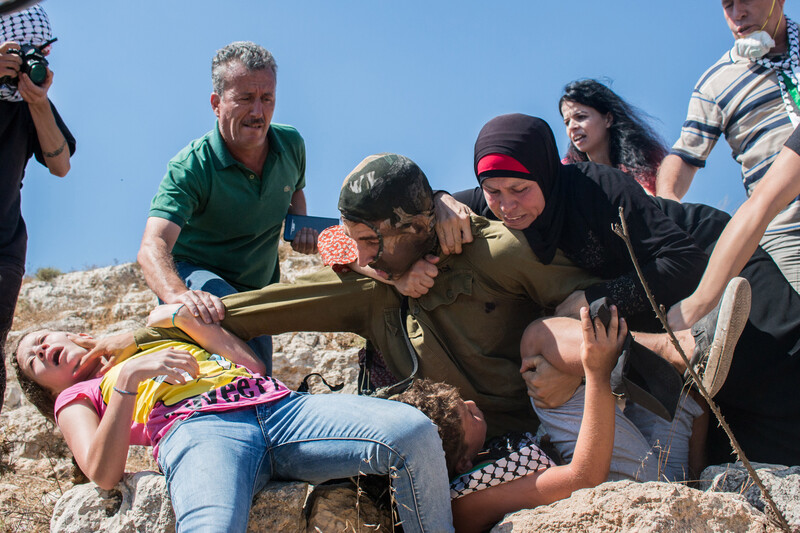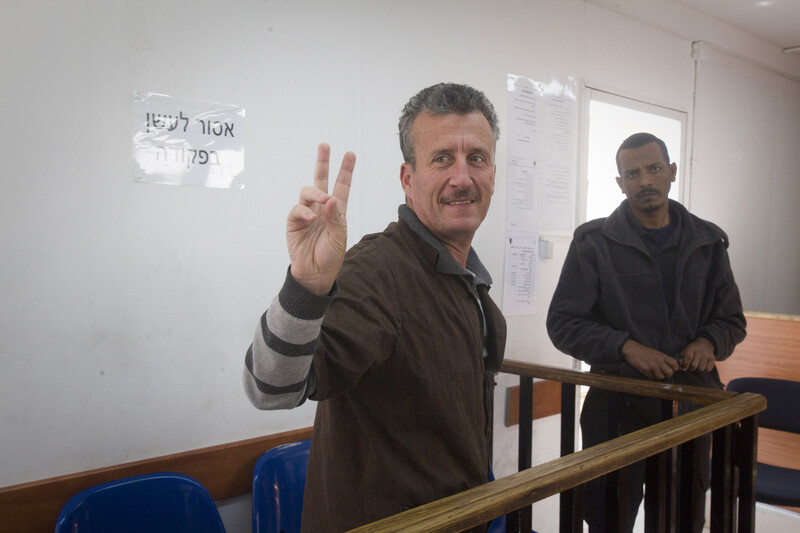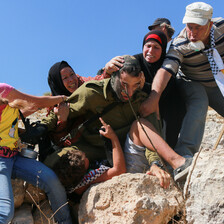The Electronic Intifada 5 October 2015

Bassem Tamimi, in a green shirt, and other family members prevent an Israeli soldier from arresting 12-year-old Muhammad Tamimi on 28 August.
ActiveStillsThe routine brutality of Israeli troops was captured in a recent video from the occupied West Bank village of Nabi Saleh. It showed 12-year-old Muhammad Tamimi being violently arrested.
The widely shared images illustrate the stark imbalance between Israel and the Palestinians. Here was a heavily armed soldier abusing a frightened and unarmed child.
Predictably, Israel and its supporters have tried to blame Muhammad’s family and neighbors for what he endured. Miri Regev, Israel’s openly racist culture minister, has even argued that the women who came to the boy’s aid should have been shot.
Vilified
Muhammad’s father Bassem is currently on a speaking tour in the US, where he has been vilified by some media outlets because he plays a prominent role in Nabi Saleh’s regular protests against the Israeli occupation. The Washington Free Beacon, a right-wing website, has alleged that Bassem uses his own children “to taunt Israeli soldiers” so that the soldiers’ behavior can be filmed.
It is one of several publications to suggest that the rock-throwing which has been known to occur during political demonstrations in Nabi Saleh provokes a violent response from Israel.
Such claims echo the rhetoric of the Israeli government. Prime Minister Benjamin Netanyahu has declared a “war” against young Palestinians who throw stones.
During the last few weeks, the Israeli government has approved tougher penalties for stone throwers. It has also broadened rules allowing soldiers to fire at protesters.
Until now, soldiers were, supposedly, permitted to open fire only if they were in danger. Because of the new changes, they will be able to shoot at protesters if anyone in the vicinity is considered a risk.
More than likely, this will lead to higher numbers of young Palestinians being killed.

Bassem Tamimi at an Israeli military court in April 2011.
ActiveStillsIn an interview with The Electronic Intifada, Bassem Tamimi pointed out that throwing stones is a tactic that has long been used by Palestinians living under Israeli occupation. Many Palestinians view throwing stones at the Israeli military as a form of unarmed resistance.
“Yes, we use stones to protect our land and our kids,” he said. “It is part of our way of struggle.”
Contrary to the impression conveyed by pro-Israel publications, it is not the youth of Nabi Saleh who provoke violence. Rather, the main source of violence is the Israeli occupation.
On the day of his son’s arrest in September, Israeli troops fired “rubber bullets, tear gas everywhere,” said Bassem. Those weapons have caused death and injuries to many Palestinians.
Bassem Tamimi is a member of Fatah, the dominant party in the Palestinian Authority.
Bassem was arrested by Israeli forces in 2011. Following a trial in a military court, he was convicted of organizing protests that Israel views as illegal and of encouraging young people to throw stones.
Beaten into coma
In 1993, he was arrested on suspicion of having killed an Israeli settler.
During interrogation, he was beaten so badly by Israeli prison officers that he entered a coma, which lasted about a week.
Bassem believes that Israel used his involvement in Fatah and his connection to his cousin, Rushdi Muhammad Said Tamimi, as excuses to arrest him. His cousin was subsequently found guilty of killing Haim Mizrahi, an Israeli living in Beit El, a Jewish-only settlement in the West Bank.
(Another man named Rushdi Tamimi was killed by Israeli soldiers during a protest in Nabi Saleh in 2012.)
Bassem himself was acquitted.
His sister Bassama died after going to visit him during his detention in Ramallah. She was reportedly pushed down a staircase by an interpreter working for the Israeli military, breaking her neck as a result.
Bassem Tamimi has reflected a great deal about how Palestinians should tackle Israel.
“I started changing my belief from violent resistance to nonviolent resistance” around 11 or 12 years ago, he said.
“International law gives us the right to resist by any means, but the means must serve the goal,” he added.
Tamimi encourages Palestinians to study the methods of protest used by Dr. Martin Luther King, Jr during the US civil rights era, as well as the international mobilization against apartheid in South Africa.
Grassroots organizing should be the focus of the Palestinian struggle, rather than talks with Israel, he argued. The “peace process” in which the political elite has been engaged since the 1990s has not benefited ordinary Palestinians.
In the few decades since the Oslo accords, Israel has stepped up its colonization of the West Bank, subjected Gaza to a siege and periodic bombing, and exacerbated its discrimination against Palestinian citizens of Israel.
“Twenty-two years of negotiations led to nothing, just more loss for the Palestinians,” said Tamimi.
Although President Barack Obama has increased US military aid to Israel, Tamimi feels that the American public is becoming more sympathetic towards the Palestinians’ plight. Palestine is one of the key focuses of activism on US campuses, for example.
“America is the guard of Israel,” he said, “And Israel is a guard of American interests in the region. But we can and must distinguish between the state and the population if we are to win this struggle.”
Jesse Rubin is a freelance journalist from New York. Twitter: @JesseJDRubin





